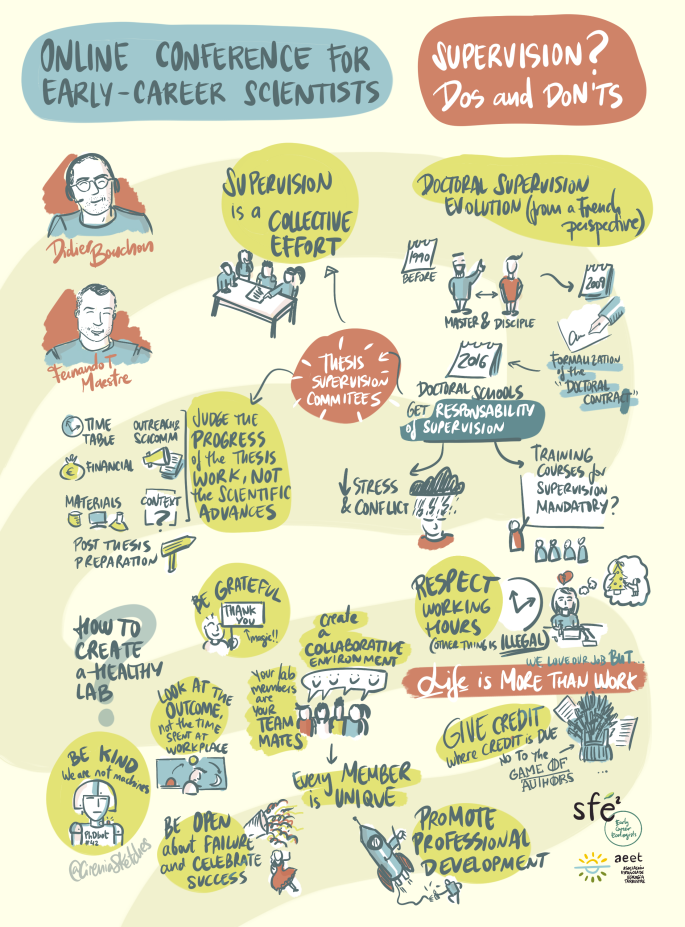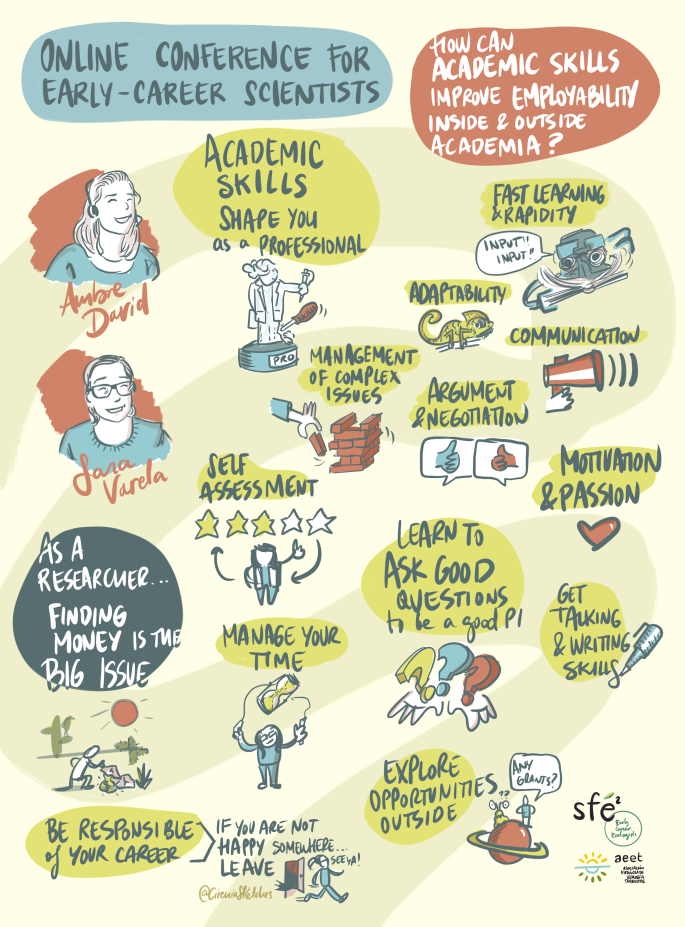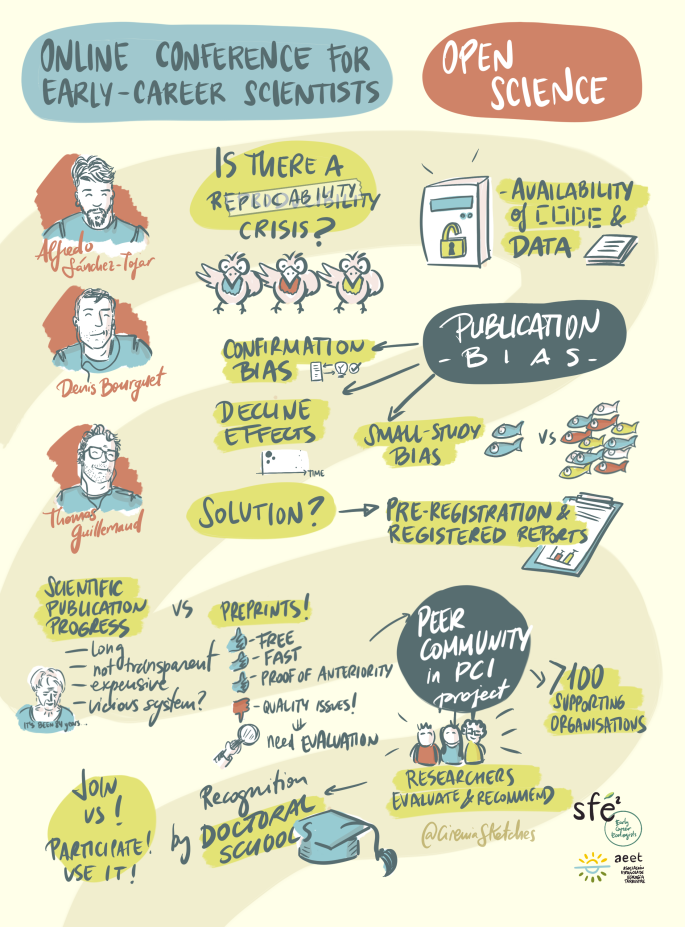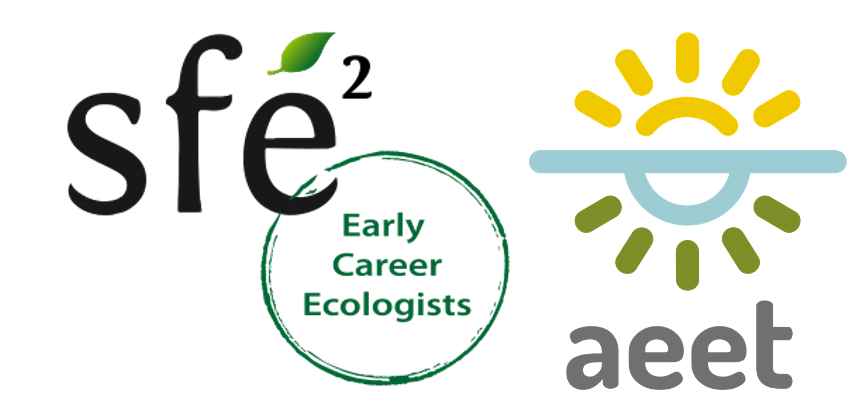Being a scientist involves much more than working on your experiments, observations, models, or producing papers. Managing work-life balance, human relationships with your peers, networking, teaching, communicating your research, all of it while navigating the complexities of building a stable career in today’s world… Yes, being a scientist is perhaps the most beautiful and fulfilling job one could think of, but it is also daunting, especially for those who are starting their academic careers.
We, at the early-career research committees of the AEET and the SFE², thought that it is time to openly discuss these complexities that are not directly related to the scientific production and dissemination of results, but are equally important to grasp. For three days in June 2021, we got together a diverse set of ecologists, from different backgrounds and at different stages of their careers, to paint a general overview of three key concepts of academic life: how to approach student supervision and lab management in 2021, employment possibilities inside and outside academia, and the increasingly important role of open science in our careers.
Student supervision in 2021

The legislation in the European Union is increasingly recognizing that student supervision is a collective effort, and that supervisors have important responsibilities to foster healthy relationships and the successful outcome of their supervised students. Didier Bouchon, Professor and Head of Doctoral School at the University of Poitiers, summarized the current legislation at the European level, and used the case of France to highlight important aspects of student supervision from different sides, from the institution, to the supervisor, to the supervised.
Maintaining healthy human relationships in research labs was the focus of the second talk, by Fernando Maestre, Professor at the University of Alicante. Fernando gave ten simple rules to create and maintain healthy lab environments, focusing on psychological well-being of the team members, respect for working hours, adaptability to different personal situations, and other important measures.
This discussion continued in the round table, in which Didier and Fernando were joined by Elena Velado (Postdoc at the Doñana Biological Station), Julien Gasparini (Professor at Sorbonne University), and Lucie Monticelli (Invited Researcher at the National Institute for Research in Agronomy and Environment). In the round table, they looked at the role of different agents in the scientific system on changing the current bad practices related to student training. They also agreed on the need for a support network for early-career researchers, and pointed out the different ways in which different administrations and institutions are dealing with this.
Resources from speakers:
https://www.labvisor.net/ – Site to share anonymous evaluations of labs/supervisors, which can help prospective students to select a lab
Employability inside and outside of academia

Ambre David, project leader in environmental strategy at Alto Step, shared her experience as a Ph.D. who has transitioned to the private sector, in her case in urban planning and environmental engineering. She talked about the switch of mindset that implied moving to the private sector, and the benefits that this career change has brought.
From the other side, we learned about the complexities of an academic career with the talk by Sara Varela, researcher at the University of Vigo. She took her own career path as an example to showcase the different options that early-career researchers have in academia, providing examples of how to approach postdoc life, grant applications, and the trade-offs involved.
After these two complementary views, Ambre and Sara were joined by Ifigenia Urbina (Senior Agronomist at BiomeMakers) and David García-Callejas (postdoc at the University of Cádiz) for the round table of the second session. In that discussion, they mentioned different alternatives that Ph.D. students have to pursue scientific careers outside academia, they talked about the strategies to keep as many doors open as possible within academia, about how to shape a CV for different types of jobs, or on what to expect from a job interview.
Resources from speakers:
Finding a job
- https://evol.mcmaster.ca/evoldir.html – Mailing list and website with offers (global)
- https://www.academictransfer.com/en/ – Search tool in and outside academia in the Netherlands (NL)
- https://www.fecyt.es/en/tematica/rebeca – Programme « REBECA » for early stage researchers interested in professional alternatives beyond academia. (ES)
- https://euraxess.ec.europa.eu/career-development/researchers/discover-careers-beyond-academia (Europe)
Networking/Making yourself known
- https://www.linkedin.com/in/ifigenia-urbina-barreto-177b58187/ – Example of a LinkedIn profile from a PhD researcher recruited outside academia
Funding
- Torres Quevedo grants (ES) for developing research and recruiting in the private sector
- Crédit Impôts Recherche (= CIR) (FR) – National tax support to private companies to conduct research, and that can also provide funds for young researcher salaries and R&D projects.
- European LIFE Programme
Open, reproducible, and transparent science

Reproducibility is a fundamental part of the scientific method, yet, as we learned in the talk by Alfredo Sánchez-Tojar, it is not so common in current scientific endeavours. Alfredo, who is a researcher at the University of Bielefeld, pointed out the magnitude of the problem and talked about different ways to mitigate and solve the reproducibility crisis. After this overview, Denis Bourguet and Thomas Guillemaud, researchers at INRAE, talked about the “Peer Community In” initiative, which is already shifting the current publishing paradigm towards more open and fair alternatives. The third session concluded with a talk and hands-on workshop by Jerome Mathieu and Xavier Raynaud (researchers at Sorbonne University) on sharing code and data, with a particular focus on version control with Git and Github.
Resources from speakers:
General & Data management
- https://www.sortee.org/ – Society for Open, Reliable, and Transparent Ecology and Evolutionary biology (SORTEE
- https://dmp.opidor.fr/public_templates (FR or ENG) – Data planning templates (DMP) useful/mandatory when writing a project proposa
- https://ropensci.org/
- British Ecological Society (2014) A Guide to Data Management in Ecology and Evolution. 21p. PDF available at this link
- Goudeseune L., Le Roux X., Eggermont H., Bishop W., Bléry C., Brosens D., Coupremanne M., Davis R., Hautala H., Heughebaert A., Jacques C., Lee T., Rerig G., Ungvári J. (2019). Guidance document for scientists on data management, open data, and the production of Data Management Plans. BiodivERsA report. 48 pp. DOI: 10.5281/zenodo.3448251 or https://www.biodiversa.org/1677/download
Journal policies & Recognition of Peer-community initiatives
- Cathleen O’Grady (2021) Fifteen journals to outsource peer-review decisions. ‘Science’ blog. Apr. 19, 2021. [online at this link
- Sherpa Romeo https://v2.sherpa.ac.uk/romeo/ – Search tool to check Journal policies [before submitting]


Commentaires récents